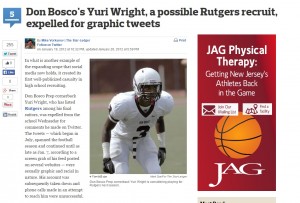To athletes: Pause before you post
by Jordan Tanner – Horizon Columnist
Yuri Wright, a 4-star corner back from New Jersey had everything going for him in the fall of 2011. After a stellar season, he was high on Michigan’s list for their recruiting class of 2012 and was planning to verbally commit to the school. Wright was in the position to get his education paid for, as well as play high level division one college football, until his Twitter was checked by the coaching staff.

Wright sent a series of racially and sexually unacceptable tweets, which ultimately cost him his scholarship to Michigan, and shed light on the reality of social media. Social media is a public platform where if you aren’t careful, everything you say, no matter the intention or context, holds weight outside of the walls of the social networking arena.
When you send a tweet, upload a new album to Facebook, or post a picture to Instagram, you have just successfully interacted with the people who follow you, and millions of other active social media users. Your words and posts, whether positive or negative can have lasting impressions on others, as well as provide them with a first impression of yourself.
As an athlete this is all true, and could be of more importance, seeing that you are presenting yourself for those around you now, as well as the many coaches who make visits to the profiles of athletes nationwide, while finding new recruits.
Accessibility to personal lives is at an all-time high, and although your likes and retweets may not always reflect it, what you post matters.
The intentions behind what you post may not be derogatory in nature, but the chance to explain yourself may be gone by the time you realize how your posts were perceived, if you get that opportunity at all.
Think of your social media page as a regularly scheduled Hesston chapel. There are certain thoughts that may be appropriate to share in conversation, but not in chapel. Same goes for social media.
There have been times where I myself have made controversial posts on social media, and although the consequences haven’t been severe, the likelihood that my posts were seen by someone and caused them to have a skewed perception of who I am, is very high.
Social media is an extension of ourselves, and no one is perfect, however, we do have the power to control what we post.
If you’re having a bad day and don’t really know how to express it, or have a funny joke that may be a little controversial; talk to friends, send a text, or make a phone call, but refrain from letting the entire world have the power to decide whether or not you are a bad person based upon what you’ve posted.
A good rule of thumb for all athletes looking to play after Hesston; if you wouldn’t say it in front of the entire school at chapel, you might want to pause before you post, and take into consideration the lasting effects your posts may have on others as well as yourself.

